When others give up, Davis asks, ‘Why not the best?’
by Heather MurphyPublic Relations
The front cover of a green book in Betsy Davis’, DMD, office asks, “Why Not the Best?”
Given to her by a patient, she admires the craftsmanship of the deep green cover and gold embossed writing. “He was close to President Carter’s family,” she said. “When he gave me this, he felt that it described what we strive for here at the clinic.”
Davis directs the Maxillofacial Prosthodontics clinic on the 10th floor of Rutledge Tower, a far cry from her roots in a tiny office in the Clinical Science Building in 1994.
“It is so rewarding to have accomplished what we worked so hard for in establishing the clinic,” Davis said. “To help our patients and see them move forward with their lives is wonderful.”
Davis and her colleagues work together blending science and art to create new eyes, ears, noses, teeth, and implants for individuals who suffer long stares and pointed fingers from those who would label them “different.”
With administrative and clinical gears well oiled and working together, Davis begins each day early and finishes late, because according to Kelly Moody, Maxillofacial Prosthodontics, she is “a dedicated, inspirational, and an incredible perfectionist.”
And her patients know it too.
Davis’ office is full of snapshots from thankful patients and when she speaks of them, you’d think she was talking about family members. She certainly treats them like family.
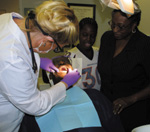 Dr.
Betsy Davis, left, examines the fit of Benjamin Dentley's obturator, which
was placed in the top portion of his mouth. His wife, Queen, and grandson,
Martin, watch as Davis demonstrates how the prosthesis fits into the hole
in Dentley's upper oral cavity.
Dr.
Betsy Davis, left, examines the fit of Benjamin Dentley's obturator, which
was placed in the top portion of his mouth. His wife, Queen, and grandson,
Martin, watch as Davis demonstrates how the prosthesis fits into the hole
in Dentley's upper oral cavity.
Marcus Brown first came to see Davis and her colleagues in 2000 after listening to one of the clinic’s nurses come to his high school and talk about her profession.
Afterwards, he approached her for the clinic’s phone number. Born without his right ear, Brown feels he was lucky in not having to experience much teasing as he grew up.


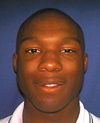 In
order to hold the prosthetic ear in place, Marcus Brown had an implant
surgically added to the spot where his right ear should have been. The
prosthetic ear works like a “snap” button and has been molded to match
the size, color, and shape of Brown's left ear.
In
order to hold the prosthetic ear in place, Marcus Brown had an implant
surgically added to the spot where his right ear should have been. The
prosthetic ear works like a “snap” button and has been molded to match
the size, color, and shape of Brown's left ear.
Now a freshman at South Carolina State University, he wears a new right ear crafted by Davis and her colleagues that matches perfectly in size, color and shape to his other ear. “She’s (Davis) really cool, she always explains the process and how each step is going to work,” Brown said.
“He’s been through so much and seems really happy to have his prosthesis,” said Kathy Hood, Maxillofacial Prosthodontics.
Off to study mathematics this fall, the confident young man seems to smile a little wider with the attachment of his new ear.
But confidence and self-respect are not the only things the clinic staff wishes to bring back to patients. Sometimes it’s simple functionality that patients crave.
In 2002, Benjamin Dentley Jr., a 60-year-old man from Dillon, began to experience nosebleeds that only seemed to get worse. Over a short period of time, his doctors at MUSC realized that a large, rare tumor spanning his palette and sinuses needed to be removed. Dentley lost 30 percent of the inside of his mouth, leaving him with a large gapping hole, and no upper gums or teeth on the left side of his mouth.
“It was difficult recovering and then the time afterwards because I was on a liquid diet. It was nice to lose 55 pounds but I tell you what, there’s nothing worse than pureed rotisserie chicken,” Dentley said.
With the addition of his new obturator, consisting of new gums and teeth for his left side, Dentley can speak, swallow and eat with more ease.
Despite having to take it easy on some favorites, like steaks and pork chops, Dentley describes his experience with Davis as a miracle of miracles.
“I believe all of our parts are written down in God’s book. My order was put in and Dr. Davis helped God in delivering,” Dentley said.
Dentley and his wife, Queen, giggle when discussing his recovery and conceded that had it not been for humor and love, on everyone’s part, Dentley wouldn’t be where he is now.
“My full compliments go to the Lord, Dr. Davis, and Dr. (Rod) Schlosser,” Dentley said.
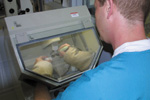 George
Perry, R.N., Maxillofacial Prosthodontics, crafts the beginnings of an
oral implant.
George
Perry, R.N., Maxillofacial Prosthodontics, crafts the beginnings of an
oral implant.
Davis and her staff are the first to tell you that success stories like Dentley and Brown are paramount to any other goal or task relating to the clinic.
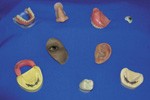 From
rows of teeth to noses, ears and eyes, Davis and her staff excel where
art and science meet.
From
rows of teeth to noses, ears and eyes, Davis and her staff excel where
art and science meet.
The clinic, the only one of its kind in the state, sees the region’s most difficult cases, and according to Davis, there’s no such thing as an easy case.
“This line of work allows you creativity and clinical expertise at the same time,” she said. “I believe the next step is to become more involved in patient-centered research. This is the weakest point in maxillofacial at this point, and we’re looking to provide more patients with functional outcomes. Because this clinic is a bridge between medicine and dentistry, we have an incredible ability and responsibility to our patients to move forward.”
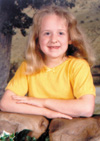
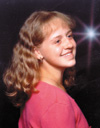 Erryn
Everard was born with a genetic predisposition for misshapened teeth, among
other oral malformations. Once teased and chided by her peers, Everard,
now 14, has an enviable smile and plenty of heads turning her way.
Erryn
Everard was born with a genetic predisposition for misshapened teeth, among
other oral malformations. Once teased and chided by her peers, Everard,
now 14, has an enviable smile and plenty of heads turning her way.
Catalyst Online is published weekly, updated as
needed and improved from time to time by the MUSC Office of Public Relations
for the faculty, employees and students of the Medical University of South
Carolina. Catalyst Online editor, Kim Draughn, can be reached at 792-4107
or by email, catalyst@musc.edu. Editorial copy can be submitted to Catalyst
Online and to The Catalyst in print by fax, 792-6723, or by email to petersnd@musc.edu
or catalyst@musc.edu. To place an ad in The Catalyst hardcopy, call Community
Press at 849-1778.